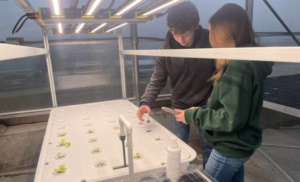 UTICA — On Oct. 20 of this year Centennial Public Schools received a gift on its football field — not an easy win but a sizable donation from a Nebraska-based hydroponics company called LivFarms.
UTICA — On Oct. 20 of this year Centennial Public Schools received a gift on its football field — not an easy win but a sizable donation from a Nebraska-based hydroponics company called LivFarms.
LivFarms, a new Nebraska-based hydroponics farm company, donated a hydroponic research unit to Centennial Public Schools during halftime at a football. The donation was in honor of a former Centennial Public Schools teacher, Anne Anderson, who taught Luke Petersen, the co-founder of LivFarms.
Now, a few months later, students at Centennial are using the research unit to grow buttercrunch lettuce and study plant science. Agricultural educator Holly Podliska said that it has been a big learning curve figuring out how to use the research unit. With the help of the ARK’s Artificial Intelligence research system and trial and error, Podliska said, she and her students have been able to figure out how to ensure that the unit’s LED grow lights and pH levels are set just right so that the lettuce seeds can germinate.
The unit is paired with an app that students can use to monitor the pH levels and electroconductivity. You can even get alerts if something unexpected happens during the grow process. The unit is called an AGEYE Agricultural Research Kart (ARK.)
Petersen first became interested in hydroponics in a class at Centennial taught by the former ag teacher Anne Anderson, a press release from LivFarms said.
Students often don’t even know what hydroponics is, Podliska said. “This is very uncommon here in the Midwest,” she added. Petersen himself said that he and his family used to grow corn and soybeans, but eventually realized that there was an opportunity in hydroponics. The company’s other co-founder is Paige Petersen, Luke’s sister. They will begin operations in the new year.
For one, Petersen said, there is a need for fresh lettuce in Nebraska. “There is limited access to fresh fruit and vegetables in Nebraska,” Petersen said. Petersen said that LivFarms has hydroponic units that are 16 feet tall, with eight grow levels. In a year they will grow 1.5 million heads of lettuce.
Plus, Petersen said, growing lettuce this way actually requires less water, which is important “for a state that needs careful water management.” Meanwhile, for Centennial students, the research unit is an opportunity to learn about plant science — and eat well too along the way. In the future, sophomores Kayla Rystron and Cael Payne said that they hope to grow “spinach, carrots, or mint.”
In the meantime, the lettuce, which the students planted in the first half of November, takes about six to seven weeks to grow. When the lettuce is fully grown, Podliska said, “I’ll probably bring some salad dressing and have snack time in class.”
Article sourced at yorknewstimes.com
